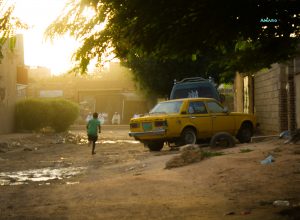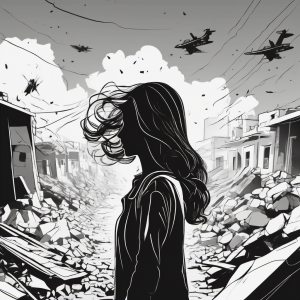Sudan’s Ongoing Civil War: A Brief Overview and Analysis
In April 2023, Khartoum, the capital of Sudan, witnessed renewed conflict between rival armed factions, sparking concerns of a return to full-scale civil war. The power struggle unfolded between the leaders of the Sudanese Armed Forces (SAF), led by General Abdel Fattah al-Burhan, and the Rapid Support Forces (RSF), a formidable paramilitary group under Mohamed Hamdan “Hemedti” Dagalo. This clash revolves around the control of the state and its resources, jeopardizing the prospects of a long-awaited democratic transition and exacerbating humanitarian conditions.
Sudan’s complex history includes being a joint protectorate of Egypt and the United Kingdom until gaining independence in 1956. Afterwards, the nation faced great internal divisions, notably between the wealthier Arab-majority northern region and the less-developed, predominantly Christian or animist southern region. This divide fueled two civil wars, with the second leading to the secession of South Sudan in 2011. Additionally, Sudan grappled with the oppressive regime of Omar al-Bashir, who ruled for three decades until a 2019 coup d’é·tat orchestrated by the SAF and RSF, headed by al-Burhan and Hemedti.
The RSF, born from the Janjaweed militia, played a key role in Darfur, committing atrocities condemned by many as genocide. Hemedti, one of Sudan’s wealthiest men, gained control of gold mines with Bashir’s support. Despite initially protecting Bashir, the RSF participated in the 2019 coup, leading to the formation of a transitional government. However, civilian leader Abdalla Hamdok faced challenges, ultimately being removed from office in 2021, triggering protests and international backlash.
Negotiations in 2022 aimed to guide Sudan towards civilian leadership and democratic elections. The December 2022 deal outlined a two-year transition, but citizens rejected it for retaining state powers within the security sector. Protests escalated, leading to violent crackdowns. As of early 2023, disagreements over the RSF’s role and integration into the SAF persisted, stalling the transition. By April, Khartoum experienced heightened tensions, with SAF and RSF forces deployed and accusations of violence exchanged. The involvement of foreign influences, including the Wagner Group and the United Arab Emirates, further complicated Sudan’s crisis, posing a significant threat to the nation’s stability.
One week ago, the RSF took control of Wad Madani, the nation’s second-largest city. During the eight-month conflict between the regular army and the paramilitary RSF, Wad Madani had hosted hundreds of thousands of refugees from the capital, Khartoum.
The Deteriorating State of Women’s Rights in Sudan
More than a million Sudanese have fled to neighbouring countries, forcing seven million of their country’s citizens from their homes, and more than 12,000 have died as a result of the war.
The state of women’s rights in Sudan was far from ideal even before the outbreak of the current conflict, but the situation has taken a devastating turn, akin to an epidemic, since the onset of war. Before the conflict, women in Sudan faced various challenges, including discriminatory laws, limited access to education and healthcare, and societal norms that perpetuated gender inequality.
However, the ongoing war has exacerbated these pre-existing issues to alarming levels. The conflict has resulted in widespread displacement, economic instability, and a breakdown of essential services. Women are disproportionately affected, experiencing heightened vulnerability to violence, displacement, and a severe lack of resources.
Instances of gender-based violence have surged, with reports of sexual assault, forced marriages, and other forms of abuse becoming distressingly common. Displacement and the breakdown of law and order have left women more exposed to exploitation and discrimination. The disruption of healthcare services further jeopardizes the well-being of women, especially through maternal health and access to reproductive care.
In October 2023, the United Nations Population Fund (UNFPA) reported that approximately 105,000 pregnant women belonged to the displaced population. Given the subsequent increase in the overall number of displaced individuals over time, it is reasonable to assume that the count of pregnant women among the displaced has also risen significantly.
The World Health Organization reports that over four million women and girls in Sudan face the threat of sexual violence. A report by UN experts, citing violations of humanitarian and human rights law by both parties, raises concerns about the extensive and brutal use of rape and other forms of sexual violence by the RSF. The experts noted that some reported incidents of rape seemed to be motivated by ethnicity and race, echoing the disturbing patterns observed during the Darfur crisis two decades ago.
“Voices of Resilience: A Woman’s Perspective on Sudan’s Civil War and the Struggle for Women’s Rights”
We talked to 21-year-old Omnia Elgunaid who just recently graduated from the faculty of international relations and diplomatic studies.
We asked her how she is coping with the current situation in Sudan, and what experiences, emotions, safety concerns, or any challenges she has faced directly as a result of the ongoing conflict in her community.
Omina told us: “We are doing our best trying to just be grateful for what we have atm such as our safety. But overall it’s a grim depressing situation and we can’t see a way out of it, it instilled such panic and terror within my community that I’m sure it’ll leave mental scars for years. We were absolutely terrified as we lived under shelling/bombing campaigns and we were scared of getting looted/raped by the RSF.”
“The people in my community are resorting to social media to help each other with money/sharing information on safer roads to flee etc but that also became challenging as the network is unstable. Humanitarian aid is inaccessible and we are trapped with no safe passages to flee, right now I think the most urgent need is safe passages for people to flee the state as it becomes dangerous. A warzone and lack of security.”
We continued to inquire with Omina, seeking information on the healthcare conditions in the region and whether Omina or her family have faced obstacles in obtaining medical services. Furthermore, if there has been displacement, we wanted to understand the impact on their daily lives and how Omina and others are managing the challenges associated with relocation.
Omina described to us that: “Healthcare is nonexistent. No hospitals, clinics or pharmacies are open. The situation is dire and catastrophic. I personally know a lady who passed because she needed an emergency c-section surgery and didn’t find any open hospital. Kidney dialysis patients are dying as well.”
“I and my immediate family have experienced displacement twice, first in April from Khartoum to Medani where my extended family lived. And once again from Medani (this time three generations of my family got displaced) to a village nearby. It has affected my life drastically and now we are living a day by day as the situation seems too grim”
Finally, we inquired with Omina about how, considering the apprehensions regarding sexual violence, women in the community are adopting safety measures. We also explored the available support mechanisms for survivors of such incidents and discussed Omina’s expectations and aspirations for the future given the prevailing circumstances.
“We are learning about ways to avoid pregnancy if rape happens,” said Omina.
She further told us that: “Support systems are nonexistent. Everyone is fending for themselves. It’s a depressing situation I really can’t stress it enough.”
“I hope for this war to end, and for the world to care. To give our lives a value. Because the amount of suffering we are living through is unimaginable.”
Conclusion: The Future of Women’s Rights Amidst Civil Unrest in Sudan
Amidst the ongoing civil war in Sudan, the future of women’s rights remains uncertain. The conflict has taken a devastating toll on Sudanese society, exacerbating the already challenging situation for women. As conflict continues to ravage the country, it is imperative for international communities and organizations to prioritize support for Sudanese women. This includes providing aid, advocating for their rights, and working towards sustainable solutions that address the root causes of the conflict and the consequent impact on women. It is only through concerted and sustained efforts that the future of women’s rights in Sudan can be improved and safeguarded.









Be First to Comment